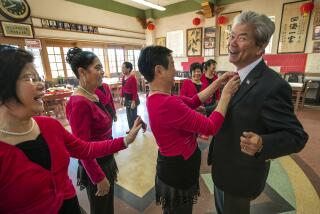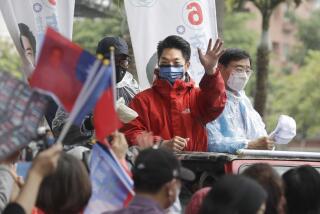In Hong Kong, the Communists Are Still Not Seen but Heard
- Share via
HONG KONG — San Ha Tsuen, a village crouched in the shadow of a mountain near the Chinese border, is about the only place around here where people will talk about Hong Kong’s biggest secret: the Communist Party.
Cheung Yuk-lan, 45, wearing a fake Rolex and a white T-shirt speckled with blood from a chicken freshly slaughtered for lunch, proudly declares his affinity for the party, which is technically illegal and largely underground.
“We’re a part of China,” says Cheung of the hamlet founded by immigrants from the mainland, all surnamed Cheung. “We don’t care if people say we’re Communists. We just know that we’re patriotic, and after 1997 we will celebrate seriously.”
The party’s influence reaches from the villages by China’s border to the Bank of China’s boardroom. Both Britain and China pretend that the Communist Party has no presence here, but in just three months it may be the territory’s ultimate master.
The prospect of the party playing the paramount role in a place where more than half the people are refugees from China’s Communist regime, and where multinational companies expect government to stay out of their dealings rather than sit on the board, is emerging as one of Hong Kong’s greatest concerns.
Last week, Hong Kong’s legislature debated how the territory is to deal with a potential overlord that is invisible and unaccountable to the people of Hong Kong after its hand-over to China. “The greater the transparency of the activities of the party, the better,” says Democratic Party legislator Anthony Cheung.
The Communist Party has been present in the territory since 1921. British surveillance and harassment drove it underground in the decade after the Communists won control of China in 1949. But because the Hong Kong government could not openly attack the party without offending China and cannot admit that it tolerates Communists in defiance of its own laws, the party has continued to exist under “a strange but practical mutual accommodation,” says Christine Loh, a legislator determined to excavate the party network.
“The rule seems to be that, not only do Britain and China not talk about the Communist Party, Hong Kong people don’t ask,” Loh says. “But as the colonial era ends and we prepare to re-integrate this society into China, how can we possibly still pretend that the Communist Party does not exist and does not matter in Hong Kong?”
Her past efforts to broach the subject were greeted with “stony official silence” on Britain’s side, Loh says, and “dismay and anger that sometimes verged on the hysterical” in China’s camp.
Loh presented a motion to the Legislative Council last week in a second attempt “to seek clarification” of the party’s future role. The debate deadlocked the council, 25-25. A tie-breaking vote from the council’s president, Andrew Wong, who also serves on the Beijing-backed Provisional Legislature, kept the veil of silence intact.
In contrast to China, where the 55-million-member party is omnipresent and much discussed, the official silence adds to Hong Kong’s anxiety. On the mainland, every organ of government, every factory and every company--including foreign joint ventures--has a party unit, whose head outranks all other leaders. Politically, party secretaries outrank provincial governors and city mayors.
The Chinese organizations in Hong Kong operate the same way, but because the party is technically illegal here, they go by different names. The party itself, for example, is known as the Hong Kong Macau Work Committee, or WorkCom, for short. Its headquarters is in the red-granite New China News Agency, an organization of 500 officials and diplomats but few actual journalists.
Its former director, Xu Jiatun, revealed the structure of the secretive group in his memoirs after he defected to the United States in 1990, describing a core inner circle of 40, made up partly of officials from “red chip” Chinese companies based in Hong Kong, such as the Bank of China, China Resources and China Travel Service. Part of the committee’s work is to organize the 10,000 or so clandestine members concentrated in pro-China companies, trade unions, newspapers, herbal medicine shops and villages throughout the territory.
It also screens deals and guides investments for member companies. When the Hong Kong government asked the Bank of China to help save a financial institution in 1985, the bank--whose sharp-angled glass tower has become a symbol of Hong Kong--had to ask permission from the mainland.
China has promised Hong Kong complete autonomy for 50 years after the July 1 hand-over, except in defense and foreign affairs. Thus Hong Kong’s next leader, Chief Executive Tung Chee-hwa, will be subordinate to the local head of China’s Foreign Ministry and the People’s Liberation Army garrison commander. People such as legislator Loh worry that the local party secretary will outrank Tung as well.
China watchers point to early Communist influence on the incoming government.
“Party officials have influenced the selection of ExCo [the Executive Council],” says Sonny Lo, a researcher who has followed the creation of the Communist network known as the United Front in Hong Kong.
Three of the 11 Executive Council officials who will advise Tung after the hand-over are known to be party members, analysts say. “But the crucial matter,” Lo insists, “is not whether they are party members but whether they are hard-liners or soft-liners on Hong Kong issues. Some are more sympathetic to the Hong Kong people.”
Although China is a one-party system, the United Front is quite fractured, Lo says. Differences between Hong Kong and Beijing’s party leaders emerged during the selection of Hong Kong’s chief executive. Hong Kong’s branch backed former Chief Justice T.L. Yang, while Beijing pushed the eventual winner, shipping tycoon Tung, whose failing company was bailed out by a Beijing-sponsored syndicate in 1985.
Divisions within pluralistic Hong Kong are even greater, Lo says, with splits along class lines--some “Red capitalists” are multimillionaires, while others are blue-collar workers fighting for benefits.
Heung Yee Kuk, another pro-China group based in rural Hong Kong, has distanced itself by lobbying to restore traditional restrictions on village women’s right to inherit land--an unpopular stance even in China, where the constitution gives women equal rights.
Currently, members are debating whether to come out of the shadows after the hand-over, when the party is expected to be legalized.
“The party has been active in Hong Kong in many ways, so it’s not a secret,” says Shiu Sin-por, the director of a Beijing-backed think tank in Hong Kong. “But you don’t see anyone running around saying they’re a party member. There’s no benefit in it.”
More to Read
Sign up for Essential California
The most important California stories and recommendations in your inbox every morning.
You may occasionally receive promotional content from the Los Angeles Times.













